Politics
Trump tariffs ruled mostly illegal by US appeals court
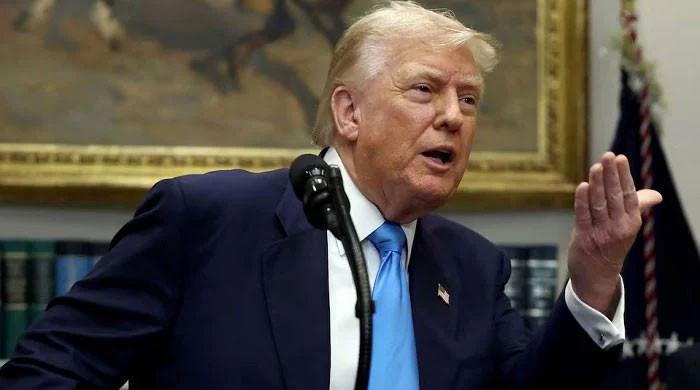
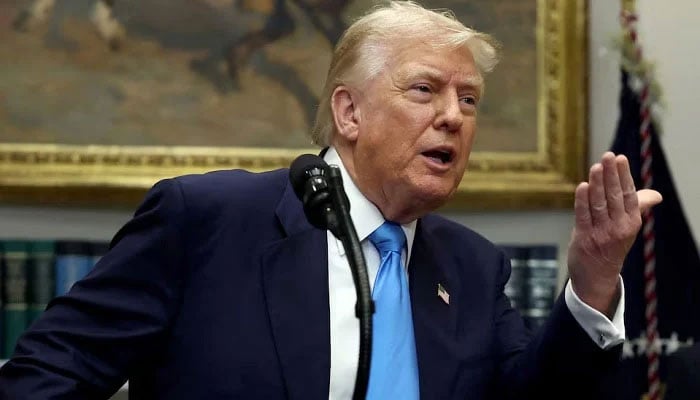
NEW YORK: A divided US appeals court ruled on Friday that most of Donald Trump’s tariffs are illegal, undercutting the Republican president’s use of levies as a key international economic policy tool.
The court allowed the tariffs to remain in place through October 14 to give the Trump administration a chance to file an appeal with the US Supreme Court.
The decision comes as a legal fight over the independence of the Federal Reserve also seems bound for the Supreme Court, setting up an unprecedented legal showdown this year over Trump’s entire economic policy.
Trump has made tariffs a pillar of US foreign policy in his second term, using them to exert political pressure and renegotiate trade deals with countries that export goods to the United States.
The tariffs have given the Trump administration leverage to extract economic concessions from trading partners but have also increased volatility in financial markets.
Trump lamented the decision by what he called a “highly partisan” court, posting on Truth Social: “If these Tariffs ever went away, it would be a total disaster for the Country.”
He nonetheless predicted a reversal, saying he expected tariffs to benefit the country “with the help of the Supreme Court.”
The 7-4 decision from the US Court of Appeals for the Federal Circuit in Washington, DC, addressed the legality of what Trump calls “reciprocal” tariffs imposed as part of his trade war in April, as well as a separate set of tariffs imposed in February against China, Canada and Mexico.
Democratic presidents appointed six judges in the majority and two judges who dissented, while Republican presidents appointed one judge in the majority and two dissenters.
The court’s decision does not impact tariffs issued under other legal authority, such as Trump’s tariffs on steel and aluminium imports.
‘Unusual and extraordinary’
Trump justified both sets of tariffs – as well as more recent levies – under the International Emergency Economic Powers Act. IEEPA gives the president the power to address “unusual and extraordinary” threats during national emergencies.
“The statute bestows significant authority on the President to undertake a number of actions in response to a declared national emergency, but none of these actions explicitly include the power to impose tariffs, duties, or the like, or the power to tax,” the court said.
“It seems unlikely that Congress intended, in enacting IEEPA, to depart from its past practice and grant the President unlimited authority to impose tariffs.”
The 1977 law had historically been used for imposing sanctions on enemies or freezing their assets. Trump, the first president to use IEEPA to impose tariffs, says the measures were justified given trade imbalances, declining US manufacturing power and the cross-border flow of drugs.
Trump’s Department of Justice has argued that the law allows tariffs under emergency provisions that authorise a president to “regulate” imports or block them completely.
Trump declared a national emergency in April over the fact that the US imports more than it exports, as the nation has done for decades. Trump said the persistent trade deficit was undermining US manufacturing capability and military readiness.
Trump said the February tariffs against China, Canada and Mexico were appropriate because those countries were not doing enough to stop illegal fentanyl from crossing US borders, an assertion the countries have denied.
More uncertainty
William Reinsch, a former senior Commerce Department official now with the Centre for Strategic and International Studies, said the Trump administration had been bracing for this ruling. “It’s common knowledge the administration has been anticipating this outcome and is preparing a Plan B, presumably to keep the tariffs in place via other statutes.”
There was little reaction to the ruling in after-hours stock trading.
“The last thing the market or corporate America needs is more uncertainty on trade,” said Art Hogan, chief market strategist at B. Riley Wealth.
Trump is also locked in a legal battle to remove Federal Reserve Governor Lisa Cook, potentially ending the central bank’s independence.
“I think it puts Trump’s entire economic agenda on a potential collision course with the Supreme Court. It’s unlike anything we’ve seen ever,” said Josh Lipsky, chair of international economics at the Atlantic Council.
The 6-3 conservative majority Supreme Court has issued a series of rulings favouring Trump’s second-term agenda but has also in recent years been hostile to expansive interpretations of old statutes to provide presidents newly found powers.
The appeals court ruling stems from two cases, one brought by five small US businesses and the other by 12 Democratic-led US states, which argued that IEEPA does not authorise tariffs.
The Constitution grants Congress, not the president, the authority to issue taxes and tariffs, and any delegation of that authority must be both explicit and limited, according to the lawsuits.
The New York-based US Court of International Trade ruled against Trump’s tariff policies on May 28, saying the president had exceeded his authority when he imposed both sets of challenged tariffs. The three-judge panel included a judge who was appointed by Trump in his first term.
Another court in Washington ruled that IEEPA does not authorise Trump’s tariffs, and the government has appealed that decision as well. At least eight lawsuits have challenged Trump’s tariff policies, including one filed by the state of California.
Politics
Netanyahu’s political future at stake with Iran war: experts

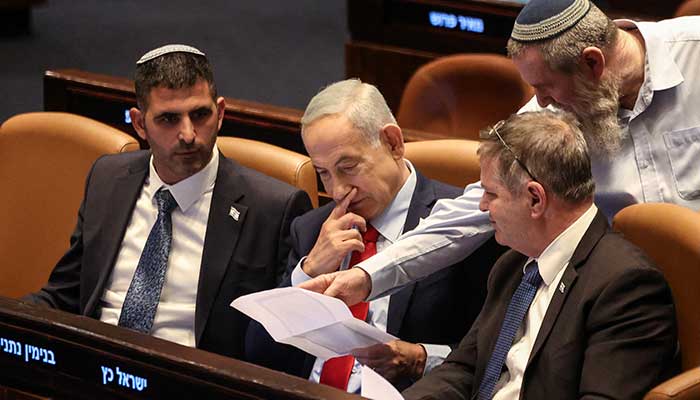
With elections approaching in Israel, the war with Iran has handed Prime Minister Benjamin Netanyahu an opportunity to restore an image deeply scarred by October 7, 2023 Gaza attack, experts say.
But any political dividend would depend on how the conflict unfolds and how long it lasts, they say.
A day after Iran’s supreme leader Ayatollah Ali Khamenei was martyred in a wave of US-Israeli strikes, Netanyahu said that his close ties with Washington had enabled Israel to “do what I have long aspired to do for 40 years: to strike the terrorist regime decisively”.
The Gaza war eroded Netanyahu’s popularity. Critics have accused him of seeking to evade responsibility for the authorities’ failure to prevent the deadliest day in Israel’s history.
At 76, the leader of the right-wing Likud party is Israel’s longest-serving prime minister, with more than 18 cumulative years in office across multiple stints.
Known for his political resilience, Netanyahu has been without a parliamentary majority since the summer, amid a crisis with his ultra-Orthodox religious allies.
He is also standing trial in a long-running corruption case and has sought a presidential pardon, with US President Donald Trump repeatedly pressuring President Isaac Herzog to grant one.
‘Total victory’
Elections must be held by October 27 at the latest.
Netanyahu will call early elections, says Emmanuel Navon, a political analyst at Tel Aviv University.
“It’s obvious. He won’t wait until October given the commemoration of the October 7 anniversary,” Navon said.
“If Netanyahu was at rock bottom after the Gaza attack, he has since gradually turned the tide,” he added.
A Likud party led by Netanyahu would emerge ahead in elections held today, opinion polls suggest.
That would likely see him tasked with forming the next government, though he would still lack a majority with his current allies.
A victory over Iran could change that calculus, experts say.
“This offensive undeniably reinforces the image Netanyahu seeks to cultivate, the one associated with his ‘total victory’ slogan,” independent geopolitical analyst Michael Horowitz told AFP.
“Netanyahu wants to show that this is not a campaign slogan but a reality. It is his national agenda and his electoral strategy,” he added.
‘Iran remains Iran’
Raviv Druker, a prominent journalist on Channel 13 television, argued that Netanyahu “will try to convince people that the victory is total even if that is an illusion,” noting that “Hamas still runs Gaza, and Iran remains Iran even after Saturday’s strike”.
On the popular news website Walla, journalist Ouriel Deskal went further, suggesting Netanyahu may have chosen the timing of the hostilities to automatically delay — under a state of emergency — the March 30 deadline for passing a budget for which he has struggled to secure a majority.
Without a budget, the government would fall on April 1 and elections would be called.
In that scenario, Netanyahu would enter the campaign from a position of weakness.
By contrast “if this war against Iran is a success for Israel, it will be a political victory for Netanyahu,” Navon said.
But should the war drag on, the picture could shift dramatically, Horowitz warned.
“Public tolerance for a long war with heavy casualties, combined with a high cost of living, remains extremely low,” he said.
During the war last June, Iranian missiles killed 30 people in Israel. Since Saturday, 10 people have been killed in Iran’s retaliatory strikes.
“Israel’s victories are primarily attributed to the army and to civilian resilience, which enabled the country to wage the longest war in its history,” Horowitz noted.
“The army’s popularity is rising, not necessarily Netanyahu’s.”
Politics
UAE Says Airspace Will Not Be Used for Attacks on Iran
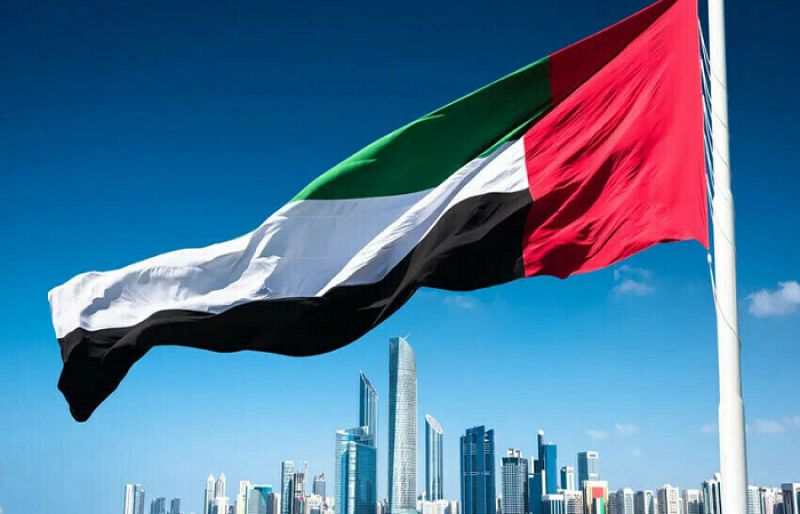

UAE says it will not allow its airspace to be used for attacks against Iran, announces security and economic measures amid regional tensions.The United Arab Emirates has announced it will not allow its airspace or territory to be used for attacks against Iran, as officials outlined security, economic and humanitarian measures during a media briefing in Abu Dhabi.
Reem Al Hashimy, Minister of State for International Co-operation, said the UAE’s position was “clear and measured.”
“The UAE will not permit its airspace or land to be used in any attack against Iran,” she said, adding that the country reserves the right to defend its sovereignty and ensure the safety of citizens, residents and visitors.
She also confirmed that the UAE had closed its embassy in Tehran and withdrawn its ambassador following recent Iranian attacks.
High Combat Readiness
Major General Abdul Nasser Al Humaidi, spokesperson for the Ministry of Defence, said the UAE would not tolerate any compromise of its sovereignty or security.
He explained that sounds heard in recent days were due to missile interceptions and confirmed that armed forces remain at a high level of combat readiness. The UAE, he said, possesses sufficient strategic defence reserves to counter aerial threats for an extended period.
Economic Measures & Supplies
On the economic front, Abdulla bin Touq Al Marri, Minister of Economy and Tourism, said the country holds strategic reserves of essential goods sufficient for four to six months.
“There is no risk of shortages,” he said, adding that authorities are monitoring markets to prevent unjustified price increases and urging residents to avoid panic buying.
He also announced that around 80 flights per day would operate during the current phase to facilitate travel for those wishing to leave.
Daily Life Continues
The National Emergency Crisis and Disaster Management Authority (NCEMA) said daily life across the UAE continues as normal, with essential services fully operational.
The statements come amid heightened regional tensions, as Gulf countries navigate security concerns while seeking to maintain stability at home.
Politics
Iranian Media Says Mojtaba Khamenei Alive, Dismisses Death Claims
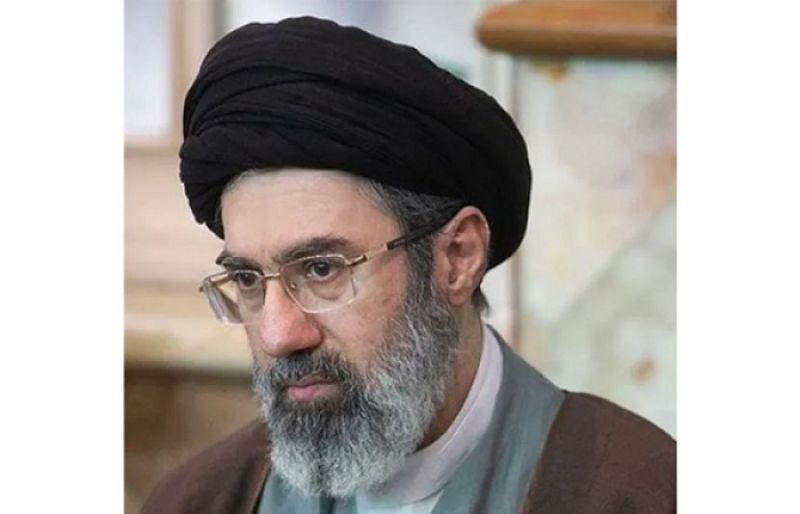

Iranian media has claimed that Mojtaba Khamenei, son of Supreme Leader Ali Khamenei, is alive and in good health, dismissing earlier foreign media reports that suggested he had been killed.
According to Iranian outlets, Mojtaba Khamenei has fully recovered and is currently overseeing key state affairs. The reports reject claims that he was killed alongside his father during recent airstrikes.
Strikes on Iran
On Saturday, Israel and the United States reportedly carried out coordinated strikes across Iran, targeting multiple locations.
Iranian media stated that:
-
The office compound of Ayatollah Ali Khamenei was struck.
-
The building of the Assembly of Experts in Qom was bombed.
-
Explosions were also reported near Enghelab Square in Tehran.
The Assembly of Experts is the clerical body responsible for appointing Iran’s Supreme Leader.
Conflicting Reports
While foreign media earlier claimed Mojtaba Khamenei had been killed, Iranian state-linked sources have strongly denied those reports. Independent verification of the claims remains limited amid ongoing hostilities and restricted information flow.
The situation continues to evolve as regional tensions remain high.
-

 Politics6 days ago
Politics6 days agoWhat are Iran’s ballistic missile capabilities?
-

 Politics6 days ago
Politics6 days agoUS arrests ex-Air Force pilot for ‘training’ Chinese military
-

 Business1 week ago
Business1 week agoHouseholds set for lower energy bills amid price cap shake-up
-

 Sports1 week ago
Sports1 week agoTop 50 USMNT players of 2026, ranked by club form: USMNT Player Performance Index returns
-

 Sports6 days ago
Sports6 days agoSri Lanka’s Shanaka says constant criticism has affected players’ mental health
-

 Business1 week ago
Business1 week agoLucid widely misses earnings expectations, forecasts continued EV growth in 2026
-

 Fashion5 days ago
Fashion5 days agoPolicy easing drives Argentina’s garment import surge in 2025
-

 Fashion5 days ago
Fashion5 days agoTexwin Spinning showcasing premium cotton yarn range at VIATT 2026






